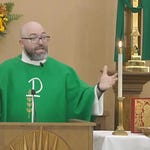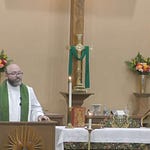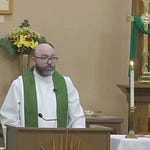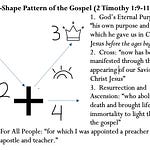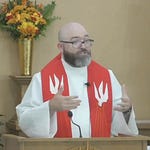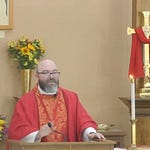Have you ever been hanging out with a group of friends, and they all seem focused on themselves? Measuring each other’s accomplishments, trying to one up each other’s stories, everyone defining their identity upon their performance? It sounds miserable. I can think of one word for that experience… “golf.”
Our Gospel scene in Luke 22:24-30 finds Jesus and his disciples at a monumental moment: The Last Supper. But the disciples are busy arguing over who’s the greatest. Meanwhile, there’s Jesus, the embodiment of true greatness, on the floor before them as a servant.
What we’re faced with is two rival paths of life: one focused on our achievement to gain approval, which is a never-ending struggle with fear and competition. The other path, the life-giving one, is anchored in the assurance of God’s unconditional love as the source of our identity.
A life centered on our achievement revolves around self-promotion and ends up in isolation from God and others. But Jesus shows us that embracing God’s unconditional love for us creates a posture of self-sacrifice and service lived out in community.
The path of achievement (verses 24-25)
A dispute also arose among them, as to which of them was to be regarded as the greatest. And Jesus said to them, “The kings of the Gentiles exercise lordship over them, and those in authority over them are called benefactors.”
The disciples fail to meet the gravity of the moment. Luke has shown us in his Gospel that Jesus has a resolute commitment to go the cross. He has made his way from the outskirts of Galilee to the center of religious life in Jerusalem. Though he received a coronation in his triumphal entry, Jesus’s ministry will be crowned on the cross. And the night of his betrayal, as Jesus spends his final moments with his closest friends, they are preoccupied with competing over their greatness.
Celebrating the feast of an apostle like Bartholomew honors their faith but reminds us of their weakness. Greatness is not found in them, but in Jesus. The apostles also show us our common condition: we, too, are prone to defining ourselves by our achievements and missing Jesus right in front of us.
And we can trace this condition all the way back to Eden. In the beginning, God created us for relationship with him. And one of the ways he established that loving relationship and fellowship was through food. In Genesis 1:29 God says, “Look at all that I have given you to eat.” A table of abundance. And when Adam and Eve grasped the fruit for themselves, they rejected relationship with God. Instead of trusting in God’s bountiful provision, they chose a path of achievement, believing they could be God without their Creator.
And we’ve been hiding ever since. When we cut ourselves off from God’s unconditional love, we flee from his presence and genuine connection with others. We live by lies: That God is our enemy, that we need to hide, that we are better off alone, and that there is no place for us.1 So we try to produce our own worth through performance and appearances. But the path of achievement only leads to competition, fear, and isolation.
But God. Even when we built walls, God made a way. He pursued relationship with us. While we sought greatness on our own terms, the Son of God stooped down from his throne to serve us, to die for us, and to raise us up to new life.
And here, at the Last Supper, we see a picture of Jesus’s true greatness, of God’s radical pursuit of us when we were too focused on our own plans and performance.
How do we earn our way to heaven? We don’t. There’s no single achievement, no matter how great, that can secure God’s approval. Because Jesus in his sacrificial love, his servant strength, has freely provided the only way to the Father.
It’s not achievement, but assurance. Our worth is not something we accomplish with our own ability, but something we receive freely from God.
Here’s the beauty of assurance in Christ. In our creation, we are fearfully and wonderfully made by God for no other reason than his delight. God’s unconditional love is expressed in your very existence. And in redemption, your worth has been secured once for all in Jesus’s sacrificial love. You don’t have to perform your way to God’s approval. Jesus has already made the way.2
The path of assurance (verse 26)
“But not so with you. Rather, let the greatest among you become as the youngest, and the leader as one who serves.”
When our identity is in the assurance of what God has done for us, when our identity is in God’s unconditional love, we can love others freely in a posture of self-sacrifice and service.
That’s true greatness. Not something we earn but something we receive—Christ’s finished work for us. Anchored in that assurance, we can let go of achievement and be real with others, to drop the mask and serve them.
At Christ The King we have a simple mission statement: “Love God, Become Disciples, Serve Others.”
What could that look like here? Community groups. Not big programs or events, but spaces where discipleship and hospitality become a radically ordinary part of life.3 Where we resist isolation or self-promotion and practice family life together.
Since my first visit here in January, I’ve heard the same thing from many of you: community groups need fresh vision. Different groups have looked very different, and without a shared sense of direction, participation has been low. Only 20 percent of our regular attendees last year were part of a group. This is not to make you feel bad… it’s an opportunity and chance to see what God has in store for us.
Now, when I say “community group,” I realize in the past they may have been called small groups or life groups. If you’ve been to other churches, you’ve probably heard a dozen different words: home groups, fellowship groups, cell groups, and my personal favorite…. foyer groups. But I like “community” because it keeps our focus outward and service-oriented. We gather not just in the church building but out in the community. And since Christ The King is spread out across St. Johns and Flagler counties, it matters that we have groups localized in those communities. So those of you on the St. Augustine beaches, St. Augustine south, and Palm Coast, for example, can gather with those closest to you. And deepen fellowship that leads to sharing life together in our ordinary rhythms of life.
Now, maybe you’re not part of a group. And guess what? That’s most of you. This is the opposite of preaching to the choir.
Maybe you’ve never been part of a group because you feel like you don’t belong, or you’re better off alone. God made you for fellowship with him, and Christ redeemed you to bring you into the family of God. In Christ, you do belong. You are not better off hiding, you are meant for more in the new life you have in Jesus.
Maybe you’ve tried a group here or at another church and it wasn’t a good experience. Maybe it was more like the Last Supper in our Gospel reading — everyone talking over each other, pretending to be perfect, or comparing who had the nicest house or the best food. But Jesus said let the greatest be small, and the leader be the one who serves. We can live free of performance and comparison. We don’t have to prove we’ve got it all figured out. We can be real, human, ordinary, sharing in our hardships and our joys.
Some of you have the gift of hospitality — you can set a table and make it look easy. Many of you may think, “There’s no way I could do that.” But that’s not the only way groups work. You don’t need to be the perfect host or have the biggest house. For the past 15 years, Kaitlyn and I have been in all sorts of groups. Once we were the youngest in a group of empty nesters who surrounded us during our engagement and first year of marriage, blessing us with their wisdom. We’ve also hosted in our homes of 1,000–1,400 square feet, with kids running everywhere. And you know what? God worked in the mess and the ordinary too.
In fact, some of the biggest life change happened in those small, imperfect spaces. I saw deep growth happen when others got to see and participate in real life together. Community Groups aren’t about perfection or performance. It’s about embracing the assurance of our belonging in Jesus Christ. And that looks like making space for God’s Word and God’s people in the middle of ordinary life.4
I invite you to pray and explore where you fit. If you’re interested in hosting or leading a group, please come talk to me after the service. Our life together is not marked by isolation, but by fellowship in homes or around a table — where we know one another face-to-face, share meals, and learn to belong as a family in Christ. Together we resist the pull of self-promotion, choosing instead sacrificial service, just as Christ laid down his life for us.
And Surprise! We are God’s guests. Look at verses 27-30.
“For who is the greater, one who reclines at table or one who serves? Is it not the one who reclines at table? But I am among you as the one who serves. You are those who have stayed with me in my trials, and I assign to you, as my Father assigned to me, a kingdom, that you may eat and drink at my table in my kingdom and sit on thrones judging the twelve tribes of Israel.”
Jesus calls you to a life of service, and when you place your trust in him and follow that path, fix your eyes on him. When you serve others, you will discover that you are Jesus’s guest, and he is serving you.5
Jesus invites you to rest in his finished work for you. He feeds and serves you. You matter, and you are treasured, because the one who created you loved you so much he went to the cross to rescue you.
When we gather together, on Sundays and in our homes, it is Jesus who feeds us. We read Scripture, nourished in the words that give us life. We share meals together, here at the Lord’s Table and in our dining rooms, all of it pointing ahead to a future banquet, the marriage supper of the Lamb.
Jesus welcomes you today to his Table, where as you kneel here you are seated in the heavenly throne room. Not because of our own worthiness but in the abundant and great mercies of our Lord. So let us draw near together, hearts united and lifted high, to approach with bold assurance the heavenly throne room of God. Here at this Table, the Servant King makes you an honored guest in his kingdom.
Leonard Sweet, From Tablet to Table, 92.
Ashley Null’s Performance Identity was a valuable read in preparing for this sermon. See the section on pages 63-64.
I borrowed this phrase from Rosaria Butterfield, The Gospel Comes With a House Key, 13.
Brad House, Community, 91-99.
Melissa D’Arabian, Tasting Grace, 200.



